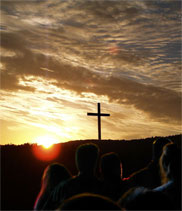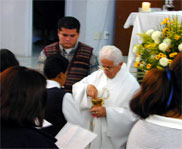Recalling God’s Sign
Next Part The “Little Horn”
Back to Saturday or Sunday
Back to By David C. Pack
Recall how, in Genesis 2:1-25, immediately after God had made man, He finished the week with one final creation: “Thus the heavens and the earth were finished, and all the host of them. And on the SEVENTH DAY God ended His work which He had made; and He rested on the SEVENTH DAY from all His work which He had made. And God blessed the SEVENTH DAY, and sanctified IT: because that in IT He had rested from all His work which God created and made” (Gen. 2:1-3).
Also recall that, from creation, God established, blessed, and sanctified (set apart) the seventh day of the week as a day of rest. He never established any other day—and confirmed that this was His Law “forever.” He told ancient Israel to “Remember the sabbath day, to keep it holy.... the SEVENTH DAY is the sabbath of the Lord your God” (Exod. 20:8, 10).
We also saw that, after a few generations in Egypt, God’s people, the ancient Israelites, lost all knowledge of His Law. God had to teach it to them again. After freeing them from slavery, the first great Law that He gave them was the command to keep the Sabbath.
Again, the Sabbath originated before the Old Covenant was established. The Ten Commandments were not given as part of the Old Covenant. They had been in force since creation.
Then, in Exodus 31:12-17, we learned that God made a special covenant with Israel regarding His Sabbath: “And the LORD spoke unto Moses, saying.... Verily My sabbaths you shall keep: for it is a SIGN between Me and you throughout your generations; that you may know that I am the LORD that does sanctify [set apart] you. You shall keep the Sabbath.... the seventh [day] is the sabbath of rest, holy to the LORD.... Wherefore the children of Israel shall keep the Sabbath ... for a perpetual covenant. It is a SIGN between Me and the children of Israel FOREVER: for in six days the LORD made heaven and earth, and on the seventh day He rested ...”
Remember, the Sabbath “sanctifies” those who keep it. They are set apart as belonging to—as being owned by—God. I repeat for emphasis: Christians are told that “you are bought with a price; be not you the servants of men” (1 Cor. 7:23) and “you are bought with a price: therefore glorify God ...” (1 Cor. 6:20).
Those who observe the Sabbath are signified as God’s people—and that He owns them. They are also publicly identified as people who keep the commandments. Civil laws require people to keep several of the other commandments (against stealing, murder, lying [perjury], etc.), so obedience to most or all of the other commandments, which the world at least generally acknowledges in one form or another, does not identify one as a commandment-keeper!
We saw the Sabbath does this! It is an automatic sign that people are of God, that they belong to God, since no one would think or choose to keep this command without it having been divinely revealed.
Recall that God established the Sabbath as a “perpetual covenant” to be kept “throughout your generations”—and “forever.” This command is ironclad—for all time. This day was to be observed forever! Doing so kept people in contact with the true God. It was the means God intended His people never lose sight of who was their God—and that they were His people! And again, if all peoples and nations kept the Sabbath, as Israel was commanded to do, no one would have ever fallen into idolatry and the worship of other gods—which has happened to all nations who have not kept it.
We must ask again: Which commandment would Satan choose to overthrow? Which commandment would he most hate—and why? Which commandment signifies that those who obey it do not belong to him?
The only commandment signifying (from which comes sign) that one belongs to God—and the only commandment that directly points to the true God of creation, thus displacing Satan, I repeat, is the SABBATH!
The devil most hates the Fourth Commandment! There is no way to get around whether one does or does not literally observe the seventh day as the Sabbath. You either do or you don’t! God and Satan know what is at stake on this point. Neither is confused. And the world as a whole can readily see whether one keeps the Sabbath or not.
Where “Sunday Keeping” Came From
Even though God commanded that the Sabbath be kept forever, we saw that the churches of the world replaced it with the popular tradition of Sunday-keeping. By now it is obvious that this practice did not come from God or His Church. But let’s see more.

PAGAN CUSTOMS AND RITUALS: The Easter Sunrise Service is a familiar scene to many millions worldwide, attempting to “worship Christ” as He supposedly rose from the grave on Sunday morning. While sincere, they are sincerely wrong! The Bible condemns this service and its pagan origin.
RCG illustration/Paula Rondeau

Source: Inertia Stock.xchng 003/Arturo
Many have assumed the unscriptural tradition that Christ was resurrected from the tomb on Sunday. If Sunday can be established as the day that Christ was resurrected, it can be a means of injecting the pagan Easter festival and celebration, with its Sunday sunrise services, into Christianity.
Many pagan festivals, including Christmas (Saturnalia), Easter (the festival of Ishtar), and worship on the day of the Sun, were observed throughout the Roman Empire long before Christ. The apostate church (the “woman”) simply adopted them into practice, and enforced them on all citizens in the empire through the civil government. Actually, the first one to enforce Sunday worship was not a Pope or a church, but was Constantine, the Roman emperor.
Here is what happened next. At the Council of Laodicea, in A.D. 363, the following decree was passed: “Christians must not Judaize by resting on the Sabbath, but must work on that day, resting rather on Sunday. But, if any be found to be Judaizing, let them be declared anathema from Christ.”
Understand what this decree meant. When one was branded “anathema” (accursed or heretic) by the church, he was arrested by the state, tortured and, unless he recanted, this continued until death. This was enforced so strictly that people were required to rest on Sunday, and work on Saturday, in order to engage in business or hold a job. This enforcement governed their “buying and selling.”
Next Part The “Little Horn”
Back to Saturday or Sunday
Back to By David C. Pack

